About The Thick Of It
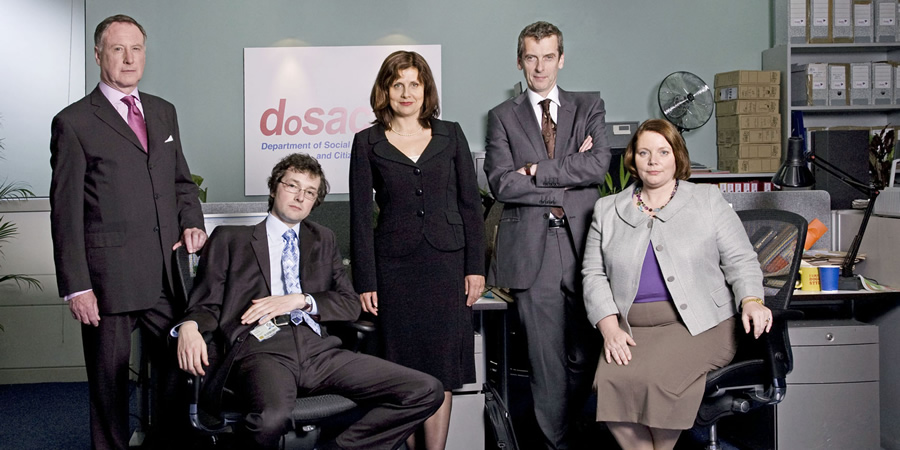
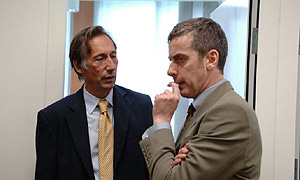
The Thick Of It, Armando Iannucci's satirical political comedy, debuted on BBC Four in 2005. Described by its creator as "Yes Minister meets Larry Sanders", The Thick Of It unveils the inner workings of the corridors of power. The comedy is set around the fictional Department of Social Affairs and Citizenship, a 'Super Department' created out of the Prime Minister's passing enthusiasm for 'joined-up government'. Unfortunately for those working in the department, the PM's patronage has moved on and it is no longer so powerful: in fact the danger of the department being axed permanently hangs over those working in it - resulting in much back-stabbing as the ministers and civil servants try to prove they're worth keeping should such a decision be made.
In the first two series (which are confusingly grouped together as "Series One" on the DVD release), it was up to minister Hugh Abbot and his team of spin-doctors to somehow keep the department from embarrassing itself enough to be eliminated. The character of Abbot has since been written out of the show. The reason for the disappearance of the character from the 2007 scripts onwards is due to the fact that actor Chris Langham was arrested in December 2005 in connection with a police investigation into internet child pornography. Following a high-profile court case, the star was jailed for the offences in 2007.
Whilst the outcome of the case was being decided, two specials were filmed in 2006, for broadcast in 2007, to fill the gap. The Rise of the Nutters and Spinners and Losers focused more upon the opposition party. The plot described Hugh Abbott as "away in Australia" and thus the was coast clear for shadow minister Peter Mannion and his team over at Opposition HQ to float a few new policies. Meanwhile, in a linked-up sub-plot the Prime Minister's unexpected announcement that he was resigning gave Malcolm Tucker just 17 hours to safeguard his career. As it happens, this turned out to be a particularly well-timed episode, as it coincided with the real-world resignation of Tony Blair.
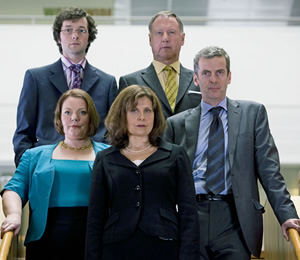
The third series finally arrived on our screens in October 2009, with Rebecca Front playing Nicola Murray MP. Given a surprise Cabinet post in a prime ministerial reshuffle, she arrives in a patterned frock to take up her new role as Secretary Of State For Social Affairs And Citizenship dreaming of getting things done.
Once in the thick of it, Nicola soon realises that achieving something is not on the agenda. By the end of the first episode she has acquired a nice chair (but been forced to put that in a skip because senior politicians can't be seen to be too comfortable) and been politically remastered in black dress and pearls, an amalgam of every female minister there has ever been.
Nicola's post is one that no-one else wants. The government is tired, its ideas are played out and it has no money. Only a fool would sign up for what is harshly known as "suicide watch".
The foul-mouthed Malcolm Tucker continues to play a key role in the new series. The character has now achieved cult status with his incandescent rants at ministers and time-serving lackeys alike. For example, YouTube is full of samples of his "brilliant swearing", a tribute to his ability to turn a dressing down into an art form. "It's great, but scary," says Peter Capaldi. "Shouting and swearing is his default position and it's expected of him, but it's a pressure, which I guess happens with all sitcom characters. It's great that Rebecca's character brings a new kind of colour to the show."
Does Peter find the swearing sessions easy to perform? "You get into a groove," he says, "they are largely scripted and I'm usually more worried about remembering the lines - one of the reasons they are so sweary is that, if I can't quite remember, I'll go for an f-word... it's an aide memoire. I do get into that zone when practising, and if real life intrudes my wife gets fed up with the swearing. She sighs with relief when it's all over."
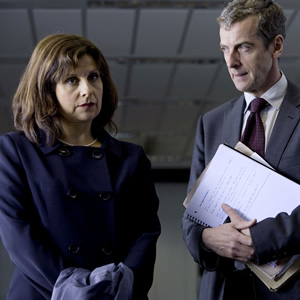
Rebecca Front on the other hand relished the opportunity to shout and be shouted at. "I didn't want it to be like many sitcoms where the woman is the sensible one and everyone around her is crazy," she says. "I talked about this with the writers and we decided we'd be missing a trick if we didn't make her a working mother, hugely under pressure. But I wanted her to be funny and have enough failings for the story to be about her and her reaction rather just a working mother juggling life, kids and husband."
In preparing for the role, Rebecca spoke to sources who'd worked in political media management. "I asked what would make a minister a complete nightmare for someone like Malcolm," she said. "The answer was: 'If they believe in things.' Nicola is very committed to ideas, but it's all guff - she thinks plastic toys should be abolished to make way for wooden ones and that social mobility is a big thing. She also has this notion about the Fourth Sector..."
What's the Fourth Sector? "I'm glad you asked that," she says, slipping into politician mode to deliver an example of The Thick Of It's trademark improvisational style. "It's all about empowering ordinary people to do extraordinary things. The Fourth Sector is between the other three sectors, but it's also the periphery around them, so it's very much encompassing. It's incorporating, it's enveloping, within and without. We want to elect certain people as fourth sector pathfinders who are ordinary people doing extraordinary things within their community... but are not vigilantes."
Amazingly, an internet search reveals that the Fourth Sector really exists and doesn't sound too far removed from Rebecca's version. "It was presented to me," she laughs, "I was told what I believed in!"
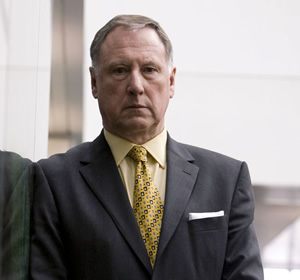
Examples of real life are often pointed out to the cast, says James Smith, who plays ineffectual senior special advisor Glenn Cullen, a man with no apparent life beyond work, no apparent personality in fact. James half expected to be written out of the new series as part of the reshuffle that brought Nicola in to replace Hugh Abbott. "I assumed Glen would be a casualty," he says, "it was great that it didn't happen. We've been working out how Glenn and Ollie (his hapless but smug junior) would survive. It's frightening that all of us end up playing a pretty close version of ourselves; I'd say that 80 percent of Glenn is me. What's alarming is that the writers pick up on aspects of your personality and lay it bare in front of you."
Peter Capaldi agrees: "You do mine a lot of yourself. It recently occurred to me that Malcolm is the same age as me. I know that sounds ridiculous, but in terms of comic references the writers are younger and have cooler references, whereas I thought I could mention Jack Buchanan or Dad's Army because he's my age."
One might suppose that being in The Thick Of It has adversely affected the cast's view of politicians, but the prevailing mood is one of sympathy. "Nicola's not a saint," says Rebecca Front, "but there are things she wants to achieve and she's frustrated at every turn. I don't think it's exclusively about politicians, it's about all kinds of office politics, relationships and people struggling to make it work while holding on to tiny bits of power."
Producer Adam Tandy agrees: "You come away feeling that none of these people are bad, they're trying to do the best they can in very difficult circumstances... and being a bit rubbish, obviously; we don't want to let them off the hook."
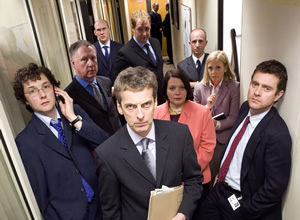
What makes The Thick Of It fairly unique is that the writing team (which includes Jesse Armstrong, Simon Blackwell and Tony Roche, plus former civil servant Martin Sixsmith) lay down fantastic premises but then allow the cast improvise around these plots. The result being the strong feeling that none of the characters quite know what they're doing. This is something the actors clearly enjoy. Producer Adam Tandy says allowing performers to run with an idea helps achieve immediacy and offers the possibility of something magical happening. Joanna Scanlan, who plays Terri, agrees: "I think Armando Iannucci really knows what he's doing, he has a fantastic blueprint. Everything is there in the script, and more, it's wonderful writing, the storylines are worked out, fabulous dialogue, but it's being changed right up to the minute you speak the words."
What about the press office at No. 10, do they like it? "Yes, they're fans," says Adam, "they dragged us in to have our photographs taken." Peter adds modestly: "They make up most of our viewers!"
Peter once met Alistair Campbell, Tony Blair's director of communications, whom many assume is the role model for Malcolm Tucker, at an awards ceremony. "Channel 4 thought it would be funny if they sat us next to each other," he says. "I didn't know anything about it until I saw the names. He was fascinating... he totally illuminated a new way of playing Malcolm, but that's in my diaries."
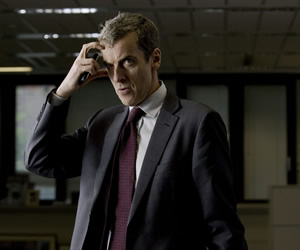
Armando Iannucci denies they've based any of the characters on real-life political figures. He says: "Malcolm Tucker isn't meant to be Alastair Campbell, but more a personification of many, many different people who lurk in Number Ten and who go around Ministries telling people what to do - or who ring up journalists and shout at them for not writing what they want."
However, the show has been carefully researched. Iannucci again: "As part of my preparation for The Thick Of It I had a sequence of discrete lunches and tea-time drinks with former government researchers, advisors, and civil servants, as well as with current political journalists. I thought their take on how politics works today would vary depending on which party or Whitehall cadre they belonged to; what was more startling was how similar a picture each one of them painted. It was as if, staying alert over my spicy tomato-juices, I'd stumbled across a fixed, unimpeachable truth about how we are governed. And the truth goes something like this."
"Ministers have very little power. They are financially and politically restrained by a centralised bunch of twenty-something policy-wonks and adminolescents at Number Ten. These people are abetted by a gang of political bouncers or 'enforcers' from the Prime Minister's Delivery Unit, who tell each Ministry what it's to do, how it's to do it, who's to get the credit for doing it if it goes well, and how to take the flack if it goes badly."
"The members of the Delivery Unit occasionally call in on the Ministries to make sure everyone's on message; it's rather like a school being inspected by OFSTED. Cabinet Ministers also have no power in that they are petrified into inactivity through fear of the media, especially The Sun and The Daily Mail."
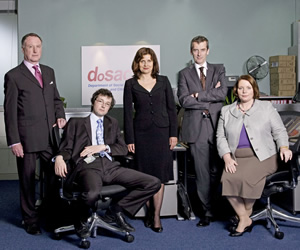
"I have heard of one Cabinet Minister being presented with two completely contrasting and contradictory policies and only making a final decision on which one to go with when he'd taken soundings from his advisors over which one would play best with the press. I've heard about another Cabinet Minister who sat his staff down and told them their principal aim was to get him a positive story in each week's News of The World. Media coverage has such a dominant hold over political life that appearance can often take greater precedence over substance."
"And there are acres of journalists who are more or less on the books of the government: unquestioning scribblers who will write anything the government asks them to write, in return for flabby scoops such as photos of Cherie Blair in a nighty."
The Thick Of It is for many compulsive, hilarious and often painful viewing. It certainly hit the ground running in 2005 winning the British Comedy Award for Best New Comedy. The show also possibly holds the record for the most use of the F word in a British comedy - there are profanities everywhere! Long may the show continue.

